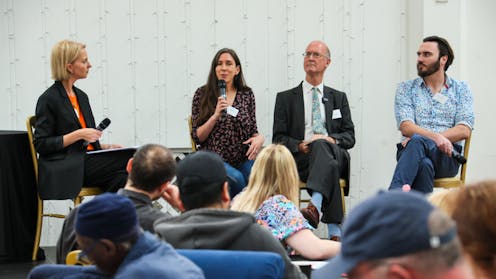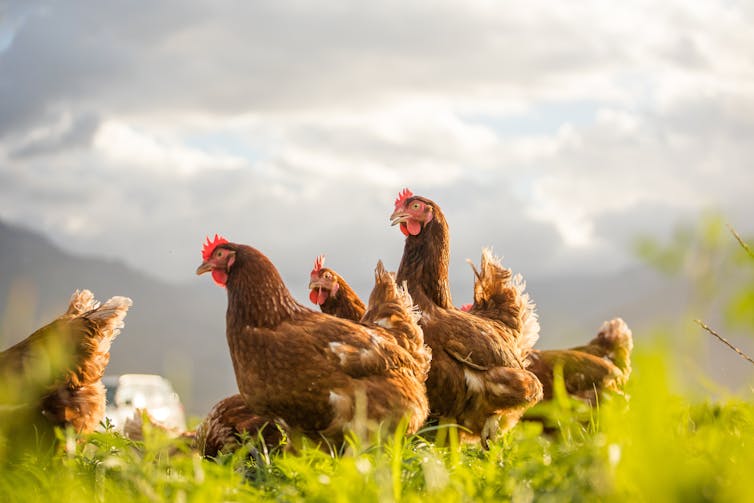
As an animal lover, should you visit zoos? Should you have pets? Should you make your garden friendly for birds, pollinators and other wildlife? Should you try to reduce meat in your diet or avoid consuming all animal products? Should you write to politicians about changing the laws for animals?
As a lecturer in animal ethics and animal welfare science, and someone who’s spent a lot of time working with animals, these are the sorts of questions I think about.
There are lots of ways to be kinder to animals. All have their merits. But the big question is: what sort of future do we want to see for animals in our society?
We live in a time where animals are facing some of their biggest challenges, from the climate crisis to industrial farming. Combined with other social issues such as the cost of living crisis and global conflicts, we as citizens and consumers have many other competing claims on our capacity to care. This can mean less attention for animals and the harms they face.
Get your news from actual experts, straight to your inbox. Sign up to our daily newsletter to receive all The Conversation UK’s latest coverage of news and research, from politics and business to the arts and sciences.
This creates a big problem. Alongside the ethical reasons for improving animals’ lives, good animal welfare can benefit everyone – among other things, care for and connections with animals improves our own mental health, fosters compassion in our communities, and can lead to improvements in our natural environment. We don’t want to lose sight of the progress we’ve made in our thinking about and treatment of animals.
It’s undeniable that there have been many welfare gains for animals over the years, but in the face of how far we still have to go, perhaps new approaches are needed. How can we conceive of new, and perhaps more radical, ways to help animals? And importantly, how do we keep animal welfare on the agenda, both socially and politically?
For over two centuries, the Royal Society for the Prevention of Cruelty to Animals (RSPCA) has played a central role in this fight. Alongside their animal rescue work, they have campaigned for changes in over 400 laws, and worked with the public to find ways to improve welfare for pets, farmed animals and wildlife.
This year they are stepping into a new frontier and have commissioned what is possibly the first ever citizens’ assembly focused entirely on animal welfare in the world, delivered with the assistance of experts from the New Citizen Project, a consultancy that specialises in citizen-led engagement. The assembly is part of the RSPCA’s Animal Futures project, which aims to examine what the future may hold for animals by 2050, and most importantly how everyone (citizens, consumers and policymakers) has a role in influencing this.

Citizens’ assemblies bring together a randomly selected representative sample of the population, who learn about and debate issues and make recommendations. It’s a form of deliberative democracy, where the people can have their say on important social and political issues.
Assemblies are a means of overcoming some of the current problems with the democratic process, like the exclusion of people who often aren’t heard in politics (such as those with less money or education, or racial and religious minorities) and polarisation between major government parties that can slow down decision-making and action.
Beyond just a focus group asking for existing opinions, citizen’s assemblies provide opportunities for members to learn and shape their thinking, to build expertise on the topics they deliberate.
Assemblies have already been used around the world on issues as diverse as abortion rights, electoral reform and food waste. As they are independently facilitated, they don’t just follow the accepted institutional narratives and can instead encourage organisations and policymakers to envision new directions for thought and action – in line with the realities of what the public believe and value.
There are now several examples of the recommendations coming from such assemblies successfully driving policy change, such as climate change reform in France.
While organisations such as the RSPCA may know a lot about animals, hosting this assembly is an acknowledgement that they don’t have all the answers about what is best for society as a whole, as we consider our interactions with animals. The scope of this problem is far larger than any one organisation can tackle alone, and through initiatives such as the citizens’ assembly, we can gain a greater insight into the possible solutions for the future.
Animal assembly
I recently attended this assembly’s opening session in Birmingham, where members were gathered from all around England and Wales (neatly marked by pins scattered across a map of the country). Looking around the room there was obvious diversity in demographics and backgroun and as I spoke with the members it was also apparent there was a wide range of opinions and beliefs on the topics we discussed.
What everyone shared was a commitment to the process – to learn from the experts who were there to introduce the topics, to deliberate and discuss carefully and thoughtfully – and a desire to contribute and influence the process. Being there felt like being part of an important moment for the future of animal welfare.
In the weeks that followed, the members of the assembly met again several times to absorb and consider huge amounts of information about topics such as farming, responsible pet ownership, wildlife, and nature. Based on this, they will make a series of recommendations that will drive change at the RSPCA.
What they produce will be used to shape its future direction, how it works, and how it lobbies governments. What these assembly members recommend could have a substantial and lasting impact on animal welfare in the UK.
Like many animal welfare experts from academia, industry or charities, I might think I have the answers on what animals need. But successful solutions require public backing to have real impact. Improving the future for animals is something that everyone has a role in and a citizens’ assembly can be a catalyst for positive change.
Don’t have time to read about climate change as much as you’d like?
Get a weekly roundup in your inbox instead. Every Wednesday, The Conversation’s environment editor writes Imagine, a short email that goes a little deeper into just one climate issue. Join the 45,000+ readers who’ve subscribed so far.
Heather Browning does not work for, consult, own shares in or receive funding from any company or organisation that would benefit from this article, and has disclosed no relevant affiliations beyond their academic appointment.
This article was originally published on The Conversation. Read the original article.







